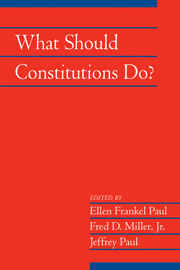Book contents
- Frontmatter
- Contents
- Introduction
- Acknowledgments
- Contributors
- What Are Constitutions, and What Should (and Can) They Do?
- Constitution and Fundamental Law: The Lesson of Classical Athens
- Contract, Covenant, Constitution
- Constitutionalism in the Age of Terror
- The Liberal Constitution and Foreign Affairs
- Do Constitutions Have a Point? Reflections on “Parchment Barriers” and Preambles
- The Origins of an Independent Judiciary in New York, 1621-1777
- Foot Voting, Political Ignorance, and Constitutional Design
- Pluralist Constitutionalism
- Deliberative Democracy and Constitutions
- The Constitution of Nondomination
- Can We Design an Optimal Constitution? Of Structural Ambiguity and Rights Clarity
- Index
Deliberative Democracy and Constitutions
Published online by Cambridge University Press: 05 June 2012
- Frontmatter
- Contents
- Introduction
- Acknowledgments
- Contributors
- What Are Constitutions, and What Should (and Can) They Do?
- Constitution and Fundamental Law: The Lesson of Classical Athens
- Contract, Covenant, Constitution
- Constitutionalism in the Age of Terror
- The Liberal Constitution and Foreign Affairs
- Do Constitutions Have a Point? Reflections on “Parchment Barriers” and Preambles
- The Origins of an Independent Judiciary in New York, 1621-1777
- Foot Voting, Political Ignorance, and Constitutional Design
- Pluralist Constitutionalism
- Deliberative Democracy and Constitutions
- The Constitution of Nondomination
- Can We Design an Optimal Constitution? Of Structural Ambiguity and Rights Clarity
- Index
Summary
INTRODUCTION
What we expect of constitutions depends on what we expect of democracies. Depending on our theory of democracy, we can plausibly have very different notions of how constitutions ought to be founded and how they ought to change. All over the world, constitutional processes have alternated between applications of two particular democratic theories. As a shorthand, I will call them Elite Deliberation and Participatory Democracy. Elite Deliberation for constitutional politics is probably best exemplified in the idea of a constitutional convention: a manageably small body of representatives who can deliberate about the appropriate design of institutions and the constraints they operate under. The American Founding offered the most prominent and successful case, inspiring many later ones, including the ill-fated convention that was supposed to provide a constitution for the European Union. Participatory Democracy can also play a role in constitutional politics. Many American states and many countries provide for constitutional changes via referendum. The rationale is that a referendum allows all voters subject to a constitution to approve it or approve changes to it. Sometimes the referendum proposals come from the people via initiatives; sometimes they come from legislatures (and hence from Elite Deliberation). But once a proposal has been made, and is to be approved via a mass referendum, completely different campaign dynamics determine the result, as any resident of California or some of the other western states will attest. All over the world, constitutional processes tend to involve one approach or the other, or some mixture of the two.
- Type
- Chapter
- Information
- What Should Constitutions Do? , pp. 242 - 260Publisher: Cambridge University PressPrint publication year: 2011
- 5
- Cited by

